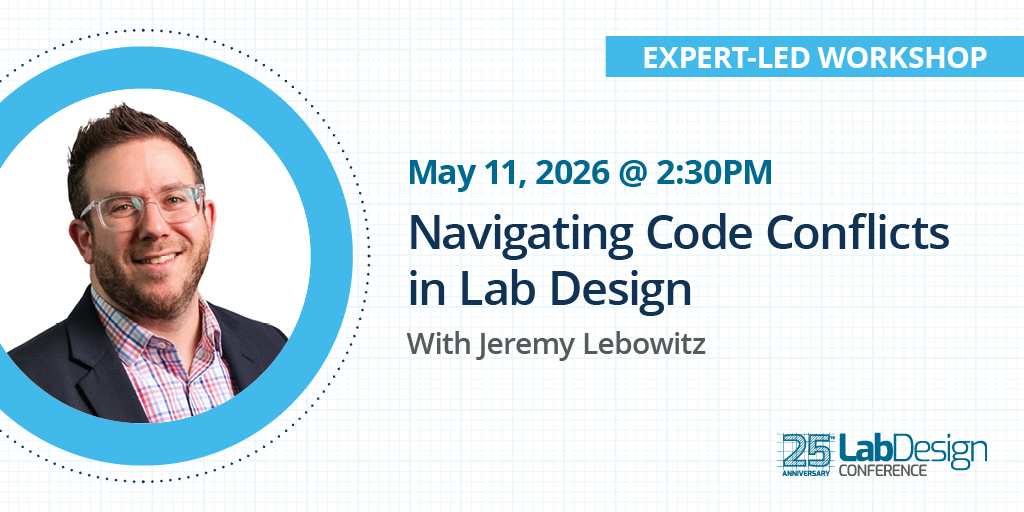Lab directors and managers responsible for ensuring lab spaces meet operational needs
Lab end users looking to have their workflows represented in design decisions
Architects and lab planners seeking strategies to better align with end-user requirements
Safety officers ensuring design supports compliance and safe operations
Life sciences real estate representatives aiming to understand evolving user demands
Contractors and equipment and furniture suppliers interested in how planning choices affect implementation
Workflow and Operational Planning: Identify strategies that promote health, safety, and efficiency in laboratory environments.
Safety in Shared Labs: Learn how to assess and accommodate ventilation, movement, and storage needs in multi-user designs.
Collaborative Communication: Apply techniques to align stakeholders around safety protocols, infrastructure flexibility, and spatial usability.
Design for Continuity: Evaluate elements such as modular casework, utility zoning, and circulation to support research continuity and minimize disruption during upgrades.
Architects, lab planners, and engineers seeking strategies to reduce legal risk while supporting safe, high-performing lab environments
Lab directors and lab managers responsible for ensuring operations comply with safety regulations and minimize liability exposure
Facility managers and safety officers focused on protecting occupant health, safety, and welfare through design and operational decisions
Scientists and lab users who want their needs considered while ensuring safe and compliant workspaces
Legal advisors interested in understanding liability implications and risk mitigation in lab design
Lab equipment and furniture suppliers seeking to understand how design decisions impact liability, safety, and regulatory compliance
Design and Liability Awareness: Recognize how lab layout, equipment placement, and workflow decisions affect legal liability and occupant health, safety, and welfare.
Risk Mitigation Strategies: Learn practical approaches to minimize liability throughout all phases of lab planning, design, and construction while maintaining safe, functional work environments.
Documentation and Compliance: Understand how to document decisions, navigate codes and standards, and collaborate with stakeholders to ensure regulatory compliance.
Lessons From Case Studies: Analyze real-world scenarios to identify hazards and apply proactive solutions for safer, high-performing labs.
Architects, lab planners, and engineers looking for practical guidance on identifying and resolving code conflicts before and during lab projects
Lab directors and managers who want to ensure designs meet overlapping codes and regulatory requirements
Facility managers and safety officers seeking strategies to proactively address compliance and protect occupant health and safety
Scientists and lab end users interested in understanding key questions to ask stakeholders and ensuring safe, compliant workflows
Legal and compliance advisors who want tools to interpret codes and provide informed guidance to project teams
Equipment and furniture suppliers aiming to understand how code requirements may impact instrument and materials choices, installation, and lab functionality
Code Conflict Recognition: Identify conflicting requirements across IBC, NFPA, NIH, insurer guidance, and local codes, and develop practical solutions that prioritize health, safety, and welfare
Engaging Authorities: Learn strategies for collaborating with AHJs to clarify code interpretations, ensure compliance, and protect lab occupants and operations.
Compliance Documentation: Gain skills to create robust records that reduce risk while maintaining safe, functional lab environments.
HSW-Driven Design: Apply health, safety, and welfare principles to translate code requirements into high-performing, flexible, and safe lab designs.
EXPERT LED WORKSHOPS
Elevate your expertise with hands-on workshops designed to enhance lab safety, efficiency, and compliance in modern lab design and operation.
Three exclusive workshops to choose from
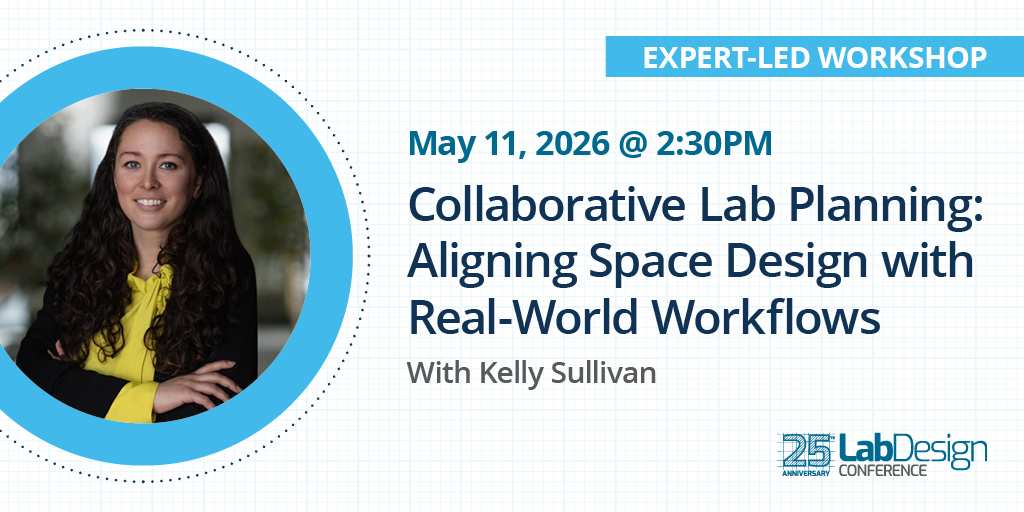
Option A
Collaborative Lab Planning: Aligning Space Design with Real-World Workflows
Expert Facilitator: Kelly Sullivan
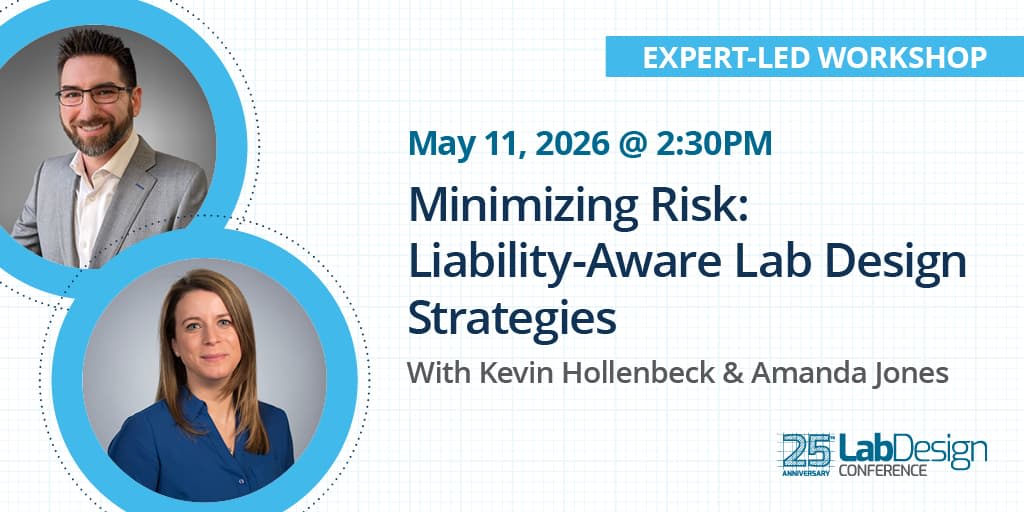
Option B
Minimizing Risk: Liability-Aware Lab Design Strategies
Expert Facilitators: Kevin Hollenbeck and Amanda Jones
WorkShop OPTION A
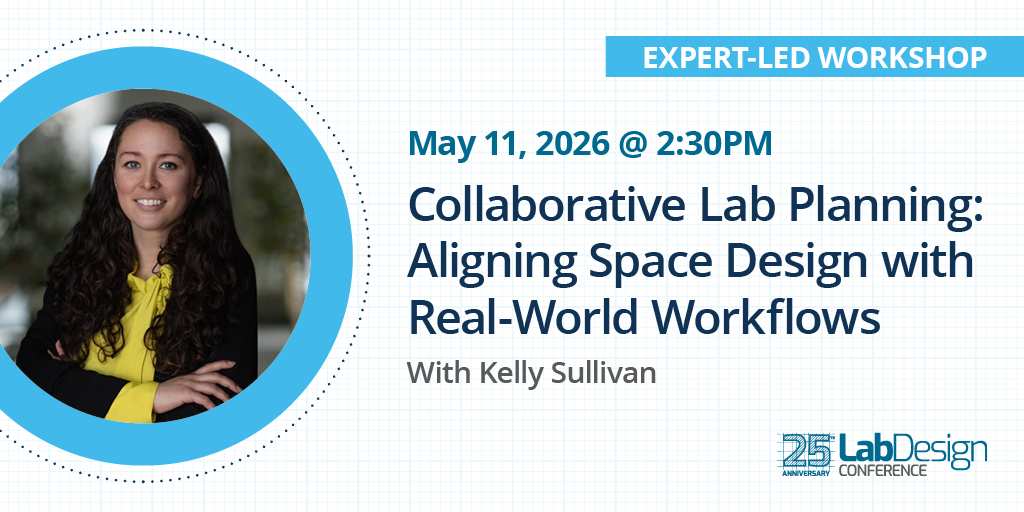
Instructor
Kelly Sullivan, PhD
Global Director of Operations & Labs
CIC
Date & Time
May 11, 2:30-4:30 pm
Cost
$215
This workshop gives you practical tools to align lab spaces with real scientific workflows, improving communication, flexibility, and efficiency. Don’t miss the chance to learn strategies that create safe, functional, and future-ready labs you can apply immediately.
Secure your spot now—space is limited!
Collaborative Lab Planning: Aligning Space Design with Real-World Workflows
Overview
The complexity of modern labs demands intentional, collaborative planning. This two-hour interactive workshop will help bridge the gap between lab users and design professionals by aligning lab spaces with real-world scientific workflows. Participants will learn to translate operational needs—such as safety, storage, and collaboration—into strategies that create flexible, functional, and future-ready labs. Topics include mapping workflows, defining shared vs. private zones, designing for flexibility, avoiding early-stage pitfalls, and fostering collaboration. Attendees will work through planning scenarios and leave with practical tools to improve communication and design alignment across stakeholders.
Who Should Attend?
This workshop is ideal for:
Key Learnings
WorkShop OPTION B
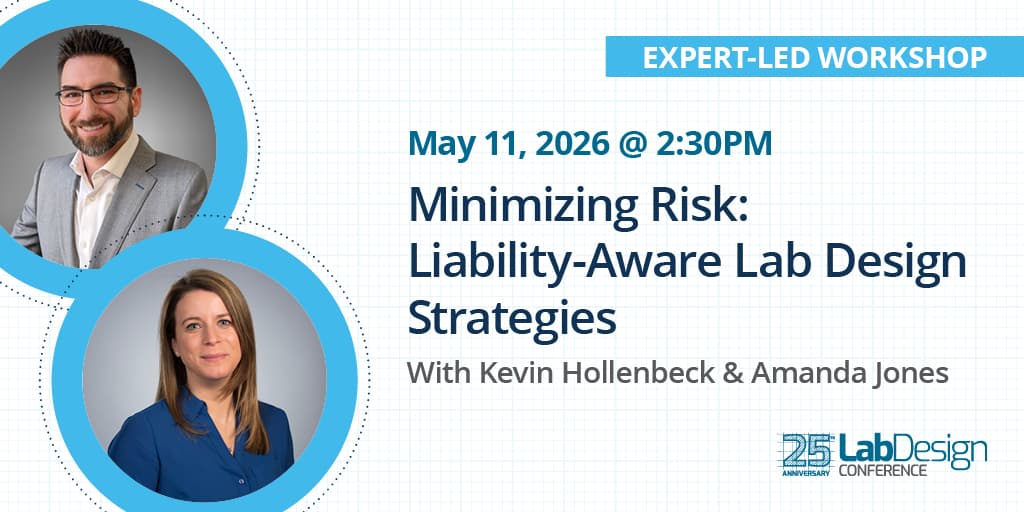
Instructors
Kevin Hollenbeck
Director of Life Sciences
Precis Engineering + Architecture
Amanda Jones
Director—Project Management
Precis Engineering + Architecture
Date & Time
May 11, 2:30-4:30 pm
Cost
$215
This workshop provides practical tools to identify and reduce legal risks while protecting occupant health, safety, and welfare. Register now to learn strategies for creating safer, compliant, and high-performing lab environments you can apply to your next project.
Secure your spot now—space is limited!
Minimizing Risk: Liability-Aware Lab Design Strategies
Overview
Modern laboratory design directly impacts legal liability and the health, safety, and welfare of occupants. This two-hour interactive workshop equips architects, lab planners, engineers, facility managers, and lab end users with strategies to identify, mitigate, and manage risks throughout all phases of lab design and construction. Participants will explore how thoughtful design choices—layout, workflow, equipment placement, and safety systems—support safe operations, regulatory compliance, and resilient, high-performing labs. Topics include reviewing case studies, collaborating with stakeholders, documenting decisions, mitigating hazards, and going beyond code to enhance safety. Attendees will leave with practical tools to reduce liability while promoting occupant well-being.
Who Should Attend?
This workshop is designed for:
Key Learnings
WorkShop OPTION C
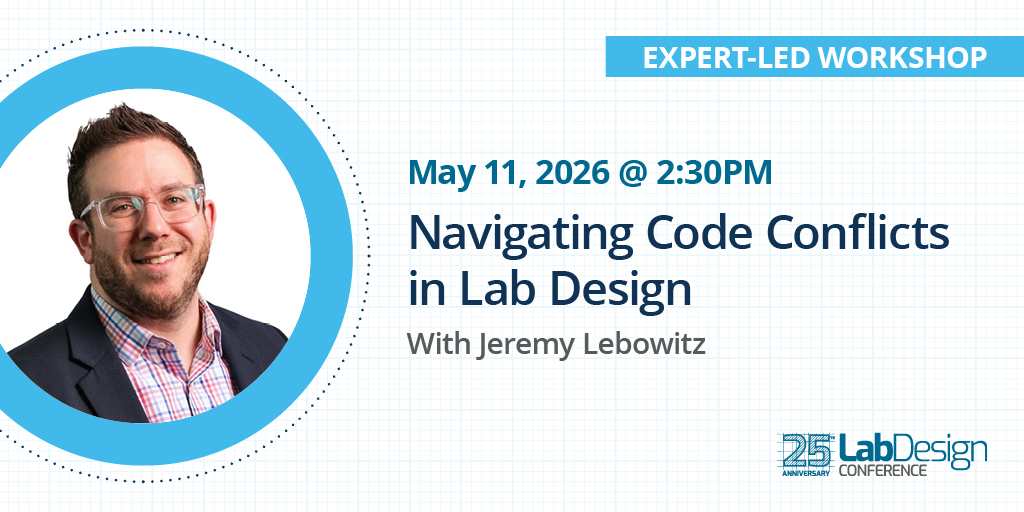
Instructor
Jeremy Lebowitz
Senior Director + Market Leader
Jensen Hughes
Date & Time
May 11, 2:30-4:30 pm
Cost
$215
This workshop equips you with practical tools to spot and resolve code conflicts while protecting health, safety, and welfare in lab environments. Attend to learn strategies for navigating overlapping codes, working effectively with authorities, and designing safer, compliant, and high-performing labs you can implement in your next project.
Secure your spot now—space is limited!
Navigating Code Conflicts in Lab Design
Overview
Complex laboratory environments often involve overlapping codes and standards that can challenge both designers and lab users. This two-hour interactive workshop equips architects, lab planners, contractors, facility managers, and bench scientists with practical strategies to identify, navigate, and resolve code conflicts while prioritizing health, safety, and welfare. Participants will explore performance-based and prescriptive compliance approaches, collaborate with authorities having jurisdiction, document compliance, and address gaps where code minimums may not ensure safe, high-performing labs. Attendees will leave with actionable tools to turn code challenges into opportunities for safer, more compliant, and functional laboratory spaces.
Who Should Attend?
This workshop is ideal for:
Key Learnings
Contact Us
LabX Media Group, Inc.
1000 N West Street, Suite 1200
Wilmington, Delaware 19801
1 888 781 0328
info@labdesignconference.com



